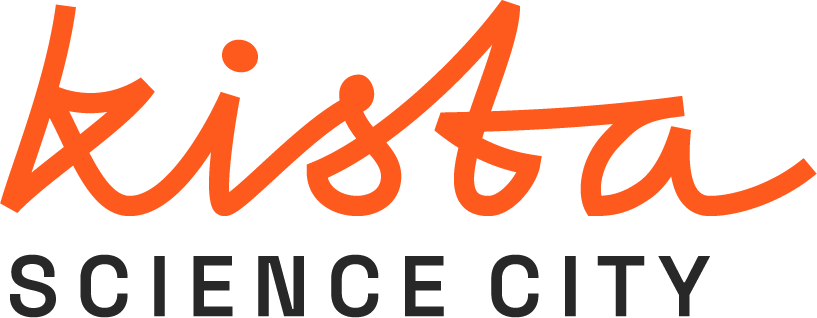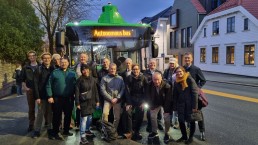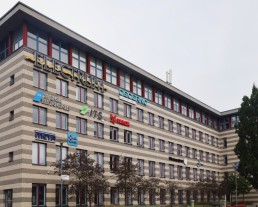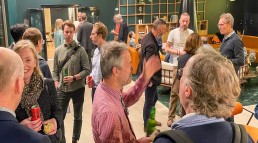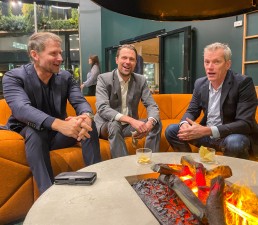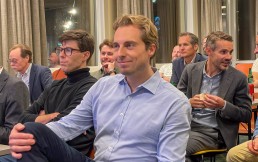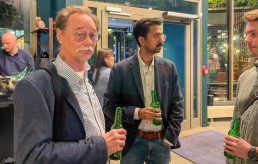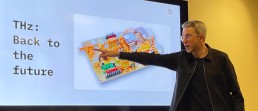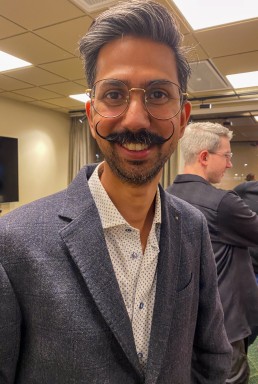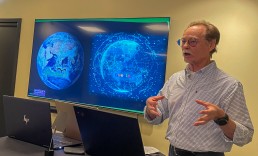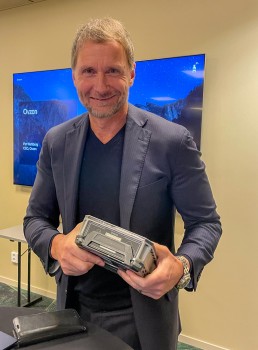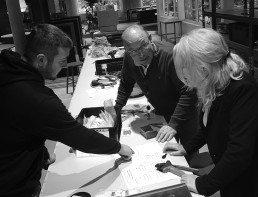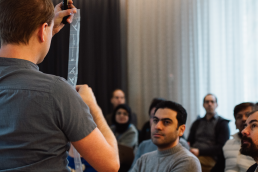Cross-border dialogue on autonomous public transport
In November 2023, the 5G Ride project partners from Ericsson, RISE, & Kista Science City, in collaboration with Drive Sweden Policy Lab, Trafikverket, and Transportstyrelsen visited Stavanger, Norway, to observe a full-scale autonomous bus in a real urban setting. This visit allowed the teams to witness the operation of a self-driving, full-scale bus navigating complex urban conditions, including traffic lights, roundabouts, lane changes, and a tunnel, at speeds of up to 40 km/h.
Observations from Stavanger
The primary objective of the Norway trip was to discuss and understand the challenges and opportunities of advanced pilot projects in autonomous public transport. The discussions highlighted the importance of close collaboration between different stakeholders – including tech developers, public transport authorities, and regulatory entities – to drive progress in this complex field. This approach is crucial for combining expertise, sharing insights, and aligning efforts towards common goals in autonomous transportation. Additionally, local Norwegian partners emphasized the value of continual development, focusing on real-world testing of these systems to enhance safety and efficiency in urban mobility.
A key topic during the Stavanger visit was the comparison of the regulatory environments for autonomous vehicle testing in Sweden and Norway. Each country’s approach to regulations and funding for research projects has significant affect for the development of autonomous transport solutions. This highlighted the importance of adaptable regulatory frameworks in supporting advancement and innovation within this field.
Applied Autonomy
The visit to Norway was hosted by Applied Autonomy, a new partner in the 5G Ride project. As a company specializing in software solutions for autonomous transportation, Applied Autonomy brings crucial expertise to the project. Their involvement is expected to enhance the project’s capabilities, particularly in terms of scalable and adaptable autonomous solutions. This partnership marks a big step in the collaborative effort to develop and implement advanced autonomous transport systems.
In addition to Applied Autonomy, the Norway visit saw participation from several organizations, including Adastec, Vy, and Kolumbus, along with representation from Statens vegvesen. Each of these organizations contributed to the success of this trip, bringing unique perspectives and expertise to the discussions and demonstrations.
Future Directions
Looking ahead, the 5G Ride project plans for new demo days and test with autonomous vehicles in Stockholm in 2024. As the project enters its next phase, the project remains committed to leveraging international learnings and local expertise to revolutionize urban mobility. The combined efforts are key in our journey towards a more connected and sustainable future in public transportation.
Internship opportunities
Internship opportunities
The collaboration between academia and industry creates a rich environment for learning and innovation. As 2024 approaches, many ocompanies and organizations in Kista are welcoming interns across a variety of technological fields. These internships provide students with the opportunity to work with experienced professionals, apply their academic knowledge in practical settings, and contribute to meaningful projects. This is an ideal chance for students from diverse backgrounds to gain valuable experience and advance their academic and professional journeys.
Explore these opportunities and find a project that aligns with your interests and career goals:
RISE Research Institute of Sweden
At RISE, interns can delve into a range of projects within the realm of the Internet of Things (IoT) and big data analysis. From exploring the security of ultra-efficient UWB networks to unlocking the future of energy-efficient IoT and analyzing nationwide cellular network traffic, RISE offers a platform for interns to engage with key technological advancements.
For detailed information on all available projects, visit RISE’s internship page.
PandionAI
PandionAI invites interns to contribute to the development of AlertSat’s geospatial support. This project offers an opportunity to work on enhancing the user interface and data flow within the AlertSat Portal, a crucial tool for decision-making based on satellite data.
Munters
Munters is seeking a Master Thesis Student within its Controls & Connectivity team. The selected candidate will work on creating sustainable climate solutions, focusing on areas like control systems, automation, and IoT.
FOI (Swedish Defence Research Agency)
FOI in Kista is looking for interns to work on diverse projects ranging from virtual gamma spectroscopic labs to defense analysis and underwater network localization. With a broad spectrum of opportunities in areas like software development, data analysis, and policy research, FOI’s internships meet the needs of a variety of interests and skills.
For detailed information on all available projects, visit FOI’s internship offerings for 2024
Excillum
Excillum offers three distinctive Master’s thesis projects. These include exploring thermal drifts in x-ray sources, understanding the limits of diamond endurance under electron beams, and developing high-resolution x-ray laminography for imaging layered components. Each project at Excillum is a blend of practical experimentation and theoretical exploration.
The new semiconductor landscape
The new semiconductor landscape
As digitalization accelerates, semiconductors become ever more crucial. This article explores the expanding microchip industry in Europe, Sweden’s central role in this growth, and how Kista-based institutions are driving advancements in this dynamic field.
Semiconductors are the technological cornerstone of modern society. These micro components power everything from mobile phones and vehicles to IoT and defense technologies. They are also vital for advancing energy-efficient systems that support the global shift towards a sustainable future. As digital demands grow, so does the need for these electronic building blocks.
Europe’s challenges and Sweden’s response
Recognizing the need for growth, the European Union is now taking decisive steps to strengthen its semiconductor industries. Accounting for just 10% of the global microchip market, the recently initiated European Chips Act is set to boost Europe’s production and enhance technological competitiveness and resilience in the sector.
Within this ambitious framework, Sweden is emerging as a key contributor. Aligned with the European goals, the country’s national strategy aims not only to revitalize its own semiconductor production but also to effectively contribute to Europe’s technological independence. In the midst of this national and international push in microchip technology stands Kista Science City.
Mikael Östling, professor at KTH Royal Institute of Technology, highlights the importance of these efforts:
– The initiative creates a need to educate thousands of engineers and retrain already working professionals. KTH is well-equipped for this, with a strong tradition of research and education in the semiconductor field. However, success also requires collaboration between universities and new startups. With its strong innovation environment, lab infrastructure, and companies in the semiconductor field, Kista has an opportunity to take a strong position in this development.
Local innovation and global impact
Kista’s mix of established companies, agile startups, and academic institutions fosters an environment where semiconductor research and development thrive. The area is home to several key players driving advancements in this field, and at the forefront of these tech ventures are KTH Royal Institute of Technology and the Electrum laboratory. The individual as well as collaborative efforts of these institutions significantly contribute to the microchip evolution, in KIsta as well as on the global stage.
KTH Royal Institute of Technology
KTH is a dynamic and multifaceted force in semiconductor research. With a broad spectrum of activities, spanning both theoretical and applied aspects, they range from developing new semiconductor materials and technologies to enhancing the efficiency and performance of existing ones. These advancements are not limited to technical aspects but also include exploring sustainable practices in semiconductor manufacturing, aligning with Sweden’s commitment to sustainable practices and, not least, UN’s Sustainable Development goals.
The Electrum laboratory
Electrum is a world-renowned laboratory with state-of-the-art facilities that serves as a center for international semiconductor research and innovation. Here, industry professionals and researchers within areas like micro and nanofabrication are provided with the resources to experiment with and refine semiconductor technologies. Electrum’s dedicated efforts ensure that the semiconductors produced meet the highest standards of performance while also being sustainable and cost-effective.
The fusion of research and innovation
The collaboration between KTH and Electrum Lab exemplifies a crucial bridge between academic research and industrial application. This partnership stands as a successful model of academia-industry collaboration, blending KTH’s theoretical insights and Electrum’s practical applications. Together, they not only facilitate the transfer of knowledge from the lab to the market but also ensure that innovations in semiconductor technology are both pioneering and relevant to current industry needs.
Looking ahead
It is the synergy of academic expertise and industrial pragmatism that positions Kista as a leader in the semiconductor field. Institutions like KTH and the Electrum laboratory are not just contributing to the local tech ecosystem; they are playing a vital role in elevating Europe’s position in the global semiconductor industry. Their efforts underline the importance of strategic partnerships and a collaborative approach in driving technological progress.
As Kista continues to be a hotbed for semiconductor research and innovation, it establishes its place as a key player in shaping the future of technology both in Sweden and across Europe.
KTH:s verksamhet koncentreras till tre campus
KTH:s verksamhet koncentreras till tre campus
KTH:s styrelse har idag tagit beslutet att pga ekonomiska skäl koncentrera sin verksamhet till tre campus och därigenom lämna Kista.
Kista Science City respekterar beslutet men ser att det är tråkigt att man väljer att lämna ett så starkt ekosystem i en tid när Sverige behöver kraftsamla kring utvecklingen av ny teknik och lösningar för hållbarhet.
KTH är idag en viktig del av Kista och starkt bidragande till områdets utveckling. KTH:s avsikt är dock att arbeta vidare med partner på plats i Kista, utveckla nya modeller för samarbeten och gemensamma utvecklingssatsningar.
I nuvarande omlokaliseringsplan ingår inte Elektrumlaboratoriet, som är ett av Stockholms viktigaste forskningslaboratorier och drivs i dag av KTH/RISE.
Hur flytten ska gå till och mer detaljerade planer om när kommer utarbetas under 2024.
Mer information på KTH’s intranät.
The growing impact of space technology
The growing impact of space technology
Space tech is rapidly transforming our world, extending its reach beyond the cosmos to tackle pressing challenges on Earth.
One key area of impact is climate change, where space-based solutions can provide unprecedented data and insights to help us monitor and analyze changes in the atmosphere. Space technology is also opening new doors for business, enabling the development of new services and markets that were previously unimagined.
Get On Top Of™ Space Tech
At Get On Top Of™ Space Tech, arranged by THINGS and Kista Science City, experts from various Stockholm-based companies came together to share their insights on the rapidly evolving sector. This forum highlighted the enormous investments that are currently being made in space tech research and development, and how these are fueling cross-industrial innovation. Topics ranged from the current state and challenges of space technology to what the future holds and the opportunities that this development presents for businesses and society at large.
At the event, Christer Andersson, Chief Vision Officer and Co-Founder of PandionAI, emphasized the economic impact of space data:
– The value derived from space data, especially satellite data, is immense and serves as a driving force for the economy. The ability to anticipate and mitigate issues, such as avoiding floods and reducing uncertainty in supply chains, showcases the transformative power of space technology in addressing real-world challenges.
As the discussion explored the broader implications of space technology, it also highlighted Sweden’s strategic role in this expanding field. Per Wahlberg, Founder and Deputy CEO of Ovzon, said:
– With a growing focus on space as the new domain, Sweden finds itself well-positioned at the forefront, thanks in no small part to contributions from Swedish corporations.
Exeger boost solar innovation in new factory
Exeger boost solar innovation in new Kista factory
Swedish deep tech company Exeger has made a significant move in sustainable energy, launching their state-of-the-art factory, Stockholm II, in Kista. This facility is one of the largest solar cell factories in Europe. Aiming to set a new European standard for sustainable solar cell production, Stockholm II leverages renewable energy sources and utilizes eco-friendly infrastructure and materials.
Unique technology
Exeger’s solar technology is unique in its ability to convert any kind of light into electrical power. This makes it ideal for a wide range of applications, including self-charging headphones, speakers, and IoT devices. The opening of Stockholm II is a significant milestone for Exeger and the solar industry as whole. The factory has the potential to produce up to 2.5 million square meters of solar cells annually.In addition to its impressive production capacity, what truly makes Stockholm II stand out is its dedication to environmental sustainability. From day one, the facility operates entirely on renewable energy, ensuring zero toxic emissions. Notably, Exeger’s eco-friendly approach is further demonstrated by their choice to repurpose an existing building into this manufacturing site.
Settling in Kista
Located in Kista Science City, Stockholm II benefits from the area’s status as a leading tech cluster. Kista’s dynamic environment, which is deeply rooted in technology and sustainability, provides the perfect backdrop for Exeger’s bold ambitions. The new location promotes technological innovation but also fosters partnerships, driving the company’s vision forward. Giovanni Fili, CEO and Founder of Exeger, shares his enthusiasm:
– Producing at this scale, with world-leading companies as customers, will make Powerfoyle the new standard for sustainability and convenience in electronics. To put it into perspective, if the whole Stockholm II production was dedicated to remote control solar cells, that could substitute over one billion batteries, having a huge impact on the environment.
The Future Ahead
With the establishment of their new factory, Exeger isn’t just strengthening their standing in the global solar industry; they significantly boost Kista’s renowned ecosystem of cutting-edge tech innovation and sustainability-focused initiatives.
Welcome Exeger!
Accurate move their headquarter to Kista
Accurate move their headquarters to Kista
The Kista tech scene just received a significant addition. Accurate, renowned for their expertise in connection technologies, electronics, and electromechanics, has made a strategic decision to set up their operations in the heart of our community.
Within their part of the tech industry, Accurate have emerged as Nordic pioneers.
Originally focused on designing state-of-the-art connection technologies – unique solutions in electronics and electromechanics for demanding environments, their range of services has grown significantly over the years.
For Accurate, the decision to move to Kista was more than just geographical. It was a strategic move to further their work with AI technology and IT security, as well as to tap into the areas deep pool of talent.
As Kash Taimoori, CEO of Accurate Consulting explains, “We see us relocating to Kista as an important step to further our work with AI technology and IT security, as well as an important recruitment base.”
Sales Manager Peter Unger adds, “There are clear benefits to operating in a tech-intensive district like Kista. The location offers opportunities for technological exchange and partnerships, which are essential for our continued growth and development.”
Accurate’s move to Kista Science City affirms their status as a leader in the tech world, including their connections to the defence and space clusters. It also boosts Kista’s role as a hub for tech innovation and collaboration.
Welcome to Kista!

Kash Taimoori, CEO of Accurate Consulting
New competence center to advance wireless communications
SweWIN: Advancing wireless communications
Kista has been a driving force in the development of wireless communication for many years and this tradition continues with the launch of the new competence center Swedish Wireless Innovation Network (SweWIN). SweWIN is a major tech initiative dedicated to leading innovation in wireless communication and sensing, with a strong focus on energy efficiency, sustainability, and fostering collaboration in the field.
Vinnova boosts Sweden’s innovation pace with a 387 million kronor investment in eleven new competence centers. One of these centers, SweWIN, will be located here in Kista Science City. As global competition in wireless tech intensifies, the center aims to be a key force in enabling Sweden’s commitment to lead, innovate, and foster collaborative platforms in this area. Central to their mission, SweWIN focuses on both promoting energy efficiency and championing the use of sustainable materials in the development of new solutions.
The initiative is led by Emil Björnson, professor in Wireless Communication at KTH. With years of experience and a notable track record in the field, Emil’s expertise and leadership are integral to shaping SweWIN’s vision. He reflects on the journey ahead:
– As society’s expectations on wireless connectivity grows, we need to keep innovating – and that’s what SweWIN is about. We’re uniting the Swedish wireless tech community to make real progress and push advancements, not just for faster connections, but also to build resilient and sustainable networks that are available everywhere and stand the test of time. By collaborating and sharing insights with each other, we aim to stay ahead in the dynamic world of wireless.
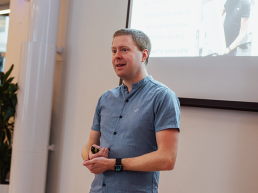
Kista Science City has a strong background in the field of wireless communications, and this aligns well with SweWIN’s goals. The history of innovative research and collaborative environments in the area made it a prime location for this initiative, according to Emil:
– If there’s anywhere that research within wireless communication should be conducted, it’s in Kista. There are numerous cutting-edge companies and startups right here, and there’s a drive for networking and tech advancement that fits perfectly with what we’re aiming for. I’m really excited to see what new innovations and partnerships will emerge.
In addition to KTH, the center will also have the participation of RISE, Ericsson, Saab, ABB, BeammWave, CellMax Technologies, and Northern Waves.
Welcome to Kista, SweWIN!
Cybersecurity in medtech: an analysis of industry risks
Cybersecurity risks for small and medium-sized medical technology companies
A recent study shows that small and medium-sized medical technology companies are particularly vulnerable to cyberattacks.
The study, part of a strategic cybersecurity development program for SMEs in Stockholm, showed that many SME generally have low risk awareness and lack a structured cybersecurity strategy.
This is a worrying development, as cyberattacks on medical technology companies can have significant consequences for the company itself, as well as for customers and suppliers.
The study also shows that companies are particularly vulnerable to cyberattacks because they often handle sensitive patient information.
Download the report to learn more about the risks and how to protect your company.
National cybersecurity innovation hub to support SME
Swedish Secure Tech Hub is a newly launched national cybersecurity innovation hub to help SMEs in creating safer digital products and solutions. We offer a variety of resources and services, from inspiration and skills development to consulting support, testing opportunities and help finding funding for concrete development initiatives.
Jop opening at Kista Science City
Project manager for cybersecurity
Do you understand the cybersecurity challenges faced by scaling companies and want to be part of the solution? Then you should apply for this position!
Vi på Kista Science City arbetar för att utveckla och stärka ekosystem av innovativa företag, universitet, forskningsinstitut och det omgivande samhället. Detta är chansen för dig som vill vara med och stärka små och medelstora företags arbete med cybersäkerhet och säker digitalisering.
Om tjänsten
Kista Science City AB arbetar för att stötta och utveckla företag genom unika samarbeten mellan näringsliv, offentlig sektor och akademi med fokus på att utveckla nästa generations teknik och affärer för en hållbar framtid.
När allt fler produkter kopplas upp och verksamheter digitaliseras ökar både företagets sårbarhet och kraven från myndigheter och kunder. Händelser i vår omvärld bidrar till en allt större hotbild mot företag. Vikten av strukturerad och strategisk cybersäkerhet har aldrig varit större. Mindre företag har samma utmaningar som större men saknar ofta både kompetens och resurser för att hantera utmaningarna. Med finansiering från bland annat EU har vi nu möjlighet att ta fram och genomföra flera insatser för att stötta företag inom området säker digitalisering.
Kista Science city söker nu en projektledare som kommer att ansvara för att leda deras arbete med att ta fram nya erbjudanden, projekt och konsortier inom cybersäkerhet med fokus på målgruppen kunskapsintensiva företag. Projektet är ett nationellt initiativ som drivs tillsammans med några av Sveriges största Science Parks. Din arbetsdag kommer att vara omväxlande, utmanande och innebära många kontaktytor. Du kommer att arbeta i en bred roll innehållande både strategiskt och operativt arbete och rollen passar dig som trivs att samverka både inom interna och externa nätverk.
Dina framtida arbetsuppgifter
- Kontakta och bygga relationer med företag och verksamheter, och utifrån det identifiera företagens behov och möjligheter.
- Tillsammans med kollegor driva utvecklingen av nya erbjudanden, samarbeten och projekt med fokus på målgruppen tillväxtbolag.
- Experimentera med format och leda interaktiva workshops, nätverk och processer som kopplar samman mindre företags behov inom området med kompetens som finns hos bla akademi och större företag.
- Strukturera arbetet och paketera olika typer av erbjudanden.
- Ansvara för att strukturera och planera arbetet för att säkerställa att mål uppnås.
- Aktivt bidra till synergier internt och att utveckla och representera hela verksamheten i Kista Science CityEn del av rollen kan också komma att innebära att leda eller stötta i Kista Science Citys olika projekt och initiativ exempelvis inom andra teknikområden kopplat till målgrupper mindre företag.
Vi söker dig som har
- Relevant examen från universitet/ högskola
- Tidigare erfarenhet av driva processer och projekt som utvecklar affär och företag
- Vana av att ta arbetsuppgifter från start till mål och presentera resultat på ett målgruppsanpassat sätt.
- Stort intresse av affärsutveckling och erfarenhet av teknikorienterade företag
- Mycket goda kunskaper i svenska och engelska
Vi ser det som meriterande
- Erfarenhet av att ha arbetat med cybersäkerhet eller säker digitalisering
Vid denna rekrytering lägger vi stor vikt vid dina personliga egenskaper, då de är avgörande för hur du kommer att lyckas i rollen och företaget. Vi letar efter dig som vill göra skillnad, gillar att jobba i team, som trivs med att bygga nya och underhålla relationer och som tror på att möten mellan människor, kunskap och kreativitet är avgörande för hållbara samhällen. För att bli framgångsrik i rollen krävs att du har ett strukturerat arbetssätt och jobbar konstruktivt i syfte att hitta synergier och värde mellan olika aktörer och initiativ.
Övrig information
Start: Enligt överenskommelse
Plats: Stockholm, Kista
Omfattning: Heltid, 40h /v
Anställningsform: Tillsvidareanställning
Kontakta Karin Bengtsson, VD, Kista Science City AB om du vill veta mer om rollen.
